Travel health
Travel health
In this chapter I would like to discuss travel health requirements, which are necessary to take care of, before going to the farthest corners of the world. We can be very well prepared for our journeys. We can survive Himalayan cold, desert heat and the surrounding filth of developing countries. But no matter how much enthusiasm we have, and no matter how confident we are about our ability to travel, let`s not let our conquest of the world to be stopped by a mosquito bite or a cat scratch. Generally there are a few things we have to take care of before we go, and I advise everyone to take health very seriously.
Review of traveller’s health issues
Health during travelling depends mostly on common sense, although in the flow of emotions it is easy to forget about taking care of yourself. Some things should be done before you go, and other things should be taken care of regularly during the trip. Here is the overview of the most important health issues:
- Before leaving, first I advice to visit a travel clinic where you’ll receive professional advice on all vaccinations and medications needed in your chosen destination. I also advise to do it well before departure as some vaccines are dosed several times and with two week intervals.
- Make sure that you’ve ticked off all the vaccinations before departure. If the full set consists for example of three injections it is necessary to take them all. We’ve had a lot of basic vaccines as children but many should be repeated every few years depending on the type. The good news is that many are funded by the National Health Service. To some of the most basic and mandatory I would include : Hepatitis A and B and in some cases even C, typhoid, polio, tetanus, diphtheria, meningitis and yellow fever. It is also worth to mention that tuberculosis is not a disease of the past! With regard to the rest I suggest to obtain professional advice in your local travel clinic.
After the outbreak of the Covid 19 plan-demic, I have mixed feelings about certain vaccines. The type of flu rose to the name of a ‘global pandemic’, which was an excuse for world leaders to shut down the economy, bankrupt people, lead them to mental illness and suicide. I recommend my article: “Political Virus Covid-19” in two parts.

For this cow it is already too late but you may still have a chance if you take care of your health. (The Vulture’s Gorge, Mongolia).
- Below I have shown the malaria map of the world where there’s the biggest risk associated with malaria. Remember that you only need one bite to die, and that about 2 million people die if it every year. About 40% of those people live in a climate which “helps” the development of malaria and the course of it is extremely unpleasant. There is no vaccine against malaria. There are only pills, which are chosen by our doctor, based on our health and the destination we choose to go to. Same pills may cause side affects such as heartburn or vomiting but I can assure that contracting malaria would be a much greater problem. Usually, you must also take two weeks before and two weeks after entering the risk area. I usually take anti malaria tablets only in the high risk countries such as India, while in low-risk areas such as Nepal and China, I only wear clothing covering arms and legs.
Also, although the map below shows the countries where there is malaria it is very common that even 90% of selected countries are safe. Countries marked in green are risk free, countries marked in blue are eliminating malaria or it occurs only regionally, mostly close to the rivers. However, the countries marked in red are high-risk but even with that I do not completely agree. The worst situation is in India and in Africa. In Southeast Asia I did not take anti malaria tablets but this decision is for every traveler to make as they are also high-risk countries. Especially during monsoon and just after rainfall we can feel the presence of mosquitoes what means that every traveller should approach each country separately, consult the trip with a doctor and then decide. Doctor should advice which medications are the best for specific regions of the world.
Whilst traveling around Asia I slept under a mosquito net, I used spray and bands against mosquitoes and I often wore long trousers and long-sleeved shirts because there are also ways to fight malaria. We also have to remember that there aren’t tablets which would give us 100% immunity to malaria. They only prolong the time from the bite to reaching a hospital to get professional help.
As a curiosity I want to add that wherever I go locals complain about White people, partly for historical reasons and partly because of the White guilt promotion in the media but it was the White people from Europe and America gave medications against malaria to the poorest countries.
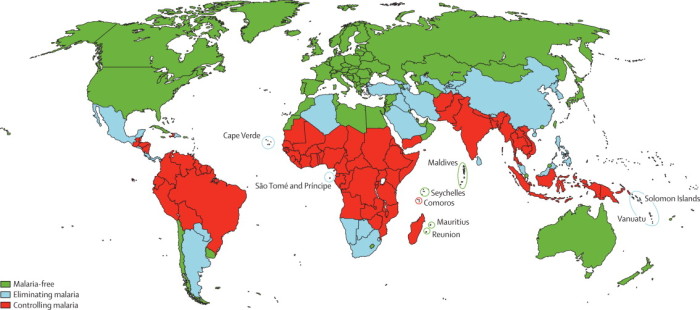
World malaria map.
- My advice is to drink only bottled water because unclean water is the source of many illnesses and a reason of many unpleasant days spent in a toilet, which can make people even more sick (the Indian Subcontinent).I always check whether the bottle top is safely screwed and covered with foil.It happens that in very poor countries people collect empty bottles and then fill them with tap water to sell to tourists for the equivalent of 5 pence (India).I also recommend to use bottled water for wash fruit bought in the street and even for brushing teeth, in case of ingestion. With regard to cold can drinks I advise to drink them without ice because the water used for production of ice comes most likely from a tap, which is by the way also used for washing feet by the whole village.I would also never recommend ice cream from a vending machine.In addition to the above water is never 100% safe because even in good restaurants vegetables and fruit are washed in water which shouldn’t be used for drinking and if that water had not been boiled it could mean a toilet nightmare for several days.
If you have already been poisoned I advise to wait calmly a few days in a well ventilated room, near toilets, having hot tea and eating boiled rice only. Unfortunately whilst travelling around India I had to go through such nightmare and this solution worked for me very well. There are also water purifying tablets but I have personally never used them. Although Africa is the undisputed champion in all diseases, in Asia the country of filth and all the health complications is definitely India.
- Food stalls serve delicious food but it might be risky. Somehow I’ve always been lucky with them and thanks to street stalls I’ve tasted a lot of new flavours at very attractive prices. Food stalls in Malaysia, Indonesia and Thailand are interesting culinary adventure which is worth experiencing. However, if you have a delicate stomach, as a rule I advise to not to eat spicy food. Especially in Thailand it is important to make sure that the cook understood to not to add any chilli.
- In many countries people still eat with bare hands and hygiene and sanitary conditions are truly tragic. Personally I’ve seen in India, Nepal, Bangladesh and Sri Lanka when a waiter put chapati on a trash bin to scare off flies and then with his dirty hands he threw it on to my table and spat on the floor. I ate in places where dishes should be called the same as the worst health complications (described in detail in my reports; especially from India, Culcutta) but I had to eat something after all. The only thing which I can advice here is to simply wash hands before every meal.

Nice monkeys but they don’t wear t-shirts with “I have rabies” on it. I advice to avoid animals and not to enter monkey colonies with food and especially not with bananas. During my travel career I’ve had several fights with them and I have to admit that they are willing to fight to the death over a banana peel; and they could infect with rabies. (Sri Lanka).
- Rabies – to vaccine or not? Definitely yes! This is a vaccination that for example in the English health care is paid and it consists of a series of three injections at weekly intervals. You might think that if you don’t have any contact with animals it doesn’t make sense to spend money on unnecessary jabs. This is obviously not true what I have already experienced myself. Even if you’ve had all the injections it still doesn’t guarantee a complete protection from bites. The injections only support the organism’s immune system, what means that in case of a bite we would have more time to go to the doctor so he could give us another series of anti – rabies jabs. If we are far away from civilization and we get bitten, then a few hours more would be very useful. Let’s remember that in the Third World countries animals and are the cradle of diseases and contact with them might be fatal.When I was in Varanasi (India) I was scratched and bitten by a cat and I had to get a new set of injections as quickly as possible.The temple priests assured me that “there was no rabies in their sacred land” but taking into account that around 60.000 people die of rabies every year, of which 20.000 in India alone, I preferred to not to rely on their “God”.I rushed to the hospital where the very look of it made me sick (details in my travel report about Varanasi, India).
Rabies exists in 150 countries and territories of the world but mainly in Africa and Asia. The most common cause of death of people are infected dogs which are responsible for 95% of all infections, although risky are also bats, raccoons, skunks, foxes and cats. Rabies is very dangerous and it is usually transmitted by wild animals onto domestic animals through their saliva during bites and scratches. All animals should be avoided because even if a dog is not aggressive and if it doesn’t drool excessively it should be remembered that it may be still infected because the incubation time lasts on average from 2 to 6 weeks. Even cleaning the wound with soap and water can save a life.
On the other hand I’m only good in theory because I provoke monkeys on purpose and I even play with venomous snakes. It is really a very stupid thing to do but I love it!
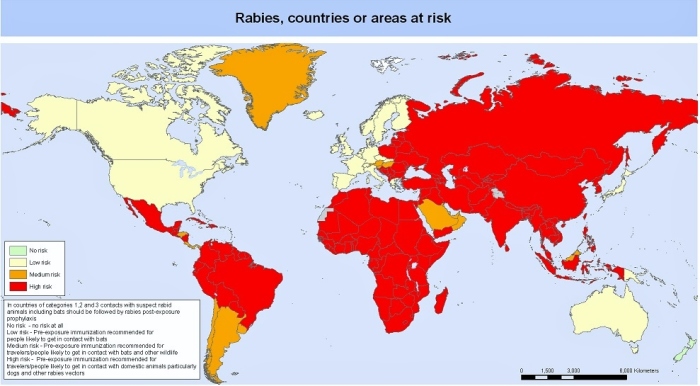
Distribution of rabies around the world (WHO map).
- Another issue are the diseases transmitted by sexual contacts and it’s not just HIV / AIDS, although this virus can be also very easily contracted through intravenous drug use. Currently about 37 mln people live with HIV worldwide, of which 2.6 million are children and only 54% are aware that they are infected. In 2014 1.2mln people died o AIDS and the most infected region is Sub – Saharan Africa. Most HIV-positive people live in South Africa (over 6 million), Nigeria (3.5 million) and India (2 million). Many African countries have at least 1 – 1.5 million infected while in the US stands at 1.2 mln (mostly Negroes).
There is a whole list of nasty surprises which at first usually reveal themselves by itching and redness in the „lower body parts”. To get infected by one of these you’d have to „earn it” because these viruses do not come from the air. As a rule I advice to keep an iron promise to yourself that every time and whatever the contact is you will use condoms, although in some countries it may be better to use two at a time and then wash yourself thoroughly in warm water. (Here I was thinking about Asia). In Africa I advice the desperate ones to use a diving suit or preferably to dip genitals in a bucket of ice water before getting on with it. The highest risk people are homosexuals and drug addicts but also those who like interracial adventures.
I think that the best advice to avoid sexual diseases is to travel with your husband / wife and live as the Bible teaches. This is the best protection.
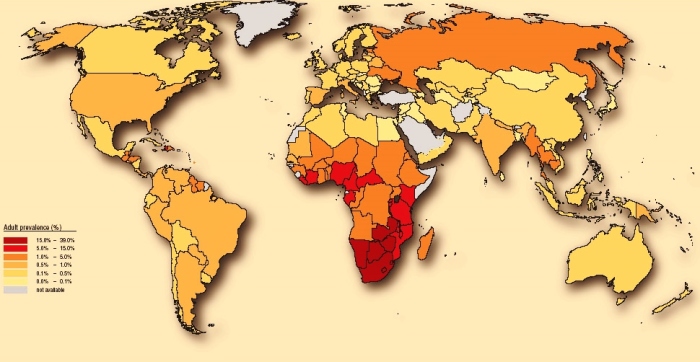
Global HIV / AIDS map.
- If you’re a woman take care of hygiene during menstruation because there are no shops in a desert or in a jungle. Do your shopping before expeditions to more remote areas.
- Pregnant woman and the father of her child must necessarily consult it with a doctor and read a lot on how to travel with an expecting mother. I believe that a pregnant woman shouldn’t travel at all. She can only go to climatically favourable, malaria free places and stay there at all times. A breastfeeding woman with a small baby in my opinion should not travel at all for the baby’s first year of life.
- Necessities. Our lives would be easier if we had: a first aid kit, vitamins, a mosquito net, sprays and bands against mosquitoes, sunglasses, hat, sunscreen, torch and depending on our trip also water purification tablets or altitude pills. Let’s remember that nights in a desert can be absolutely black and without a torch we could seriously damage ourselves.
- Perhaps you have a lasting illness like diabetes or epilepsy? If so, calculate how long your trip would take and stock up to cover yourself for extra 2 weeks. If you know that you would stay longer than the extra two weeks think when you’ll get to a big town so you could see a doctor and get a prescription. This time India did not disappoint me. After being bitten by a cat I bought extra shots at the pharmacy against rabies and I injected it myself in the guest house.
- Imagine that you are in Nepal and you went for a long and exhausting expedition around Himalayas. Unfortunately when you were already quite high you broke your leg and provided that there is good visibility and good weather the helicopter can pick you up from the top what unfortunately costs a lot of money. Would you want to pay for that service £2000? What if the only doctor in the mountain town of Pokhara also went to the mountains and there is no one to fix your leg, and the situation is so complicated that you would have to drive to Kathmandu? Travelling at night at the edge of the Himalayas is impossible and the roads are so bad that your health could get much worse. You would therefore need to fly by a helicopter what would cost another £2000. That’s why I advice to buy adequate travel insurance.
Travellers are always under impression that everything will be always fine but sometimes it is not. Maybe you would like to do a diving course in Thailand or the Philippines but what if the weather changes and you hit your hand over a sharp rock what needs stitching. I could give a lot of examples. Money saving people would have to keep their fingers crossed that everything would be fine.
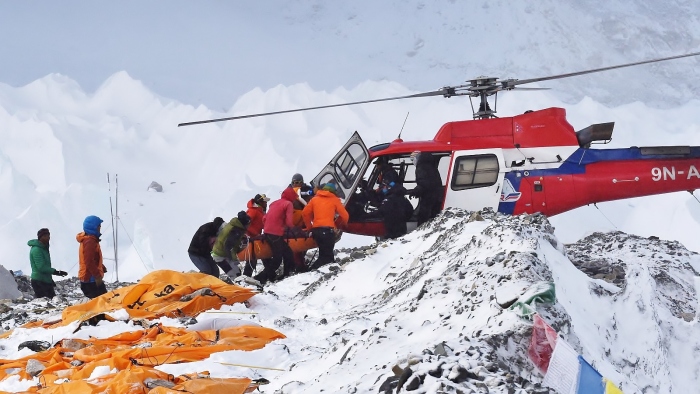
Rescuers in the Himalayas.
- Drugs and alcohol destroy health not only during travelling but it is worth to mention them. Drunk people are less careful on the road and more likely to be attacked by the locals, while lonely drunk women give invitation to rape. Alcohol abuse and the so-called ‘social drug use’ opens up to a lot of diseases, both physical and mental.
I hope these tips will help travelling safer; and remember that the colder the region the healthier it is because some diseases do not occur below certain temperatures and above certain altitude.
I also recommend the climatic zones on my website.






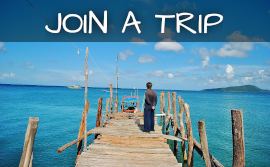
















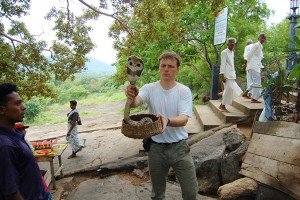


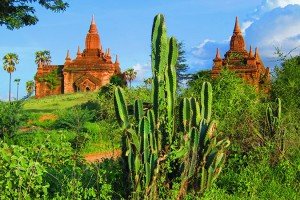
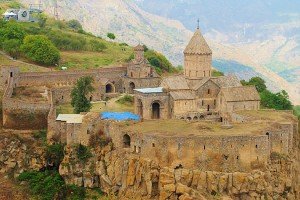
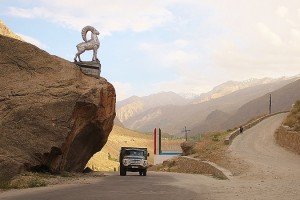

Travel Vaccinations
Thanks for this useful information. I always conscious about my health before traveling anywhere. I never want to feel sick while traveling. I always take proper travel vaccinations before travel so that I can stay fit and healthy while traveling.